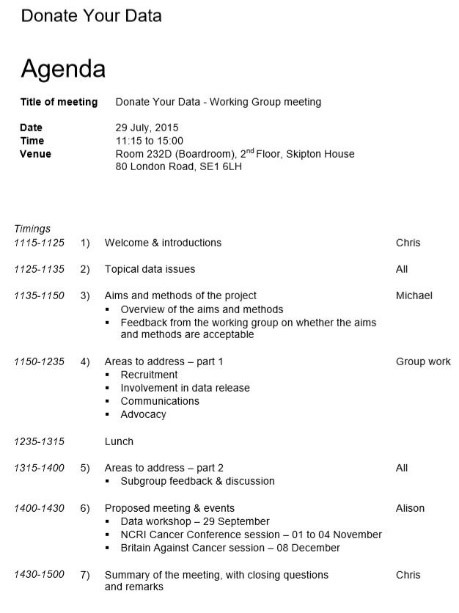Our history

Beginnings – Donate Your Data
use MY data began on 09 June 2015 at the National Cancer Intelligence Network conference, in Belfast.
In response to concerns about how the proposed Care.data programme was causing cancer research to stop, patients, carers and relatives gathered together, over a lunch time session. The session was jointly hosted by Cancer52, Cancer Research UK and the National Cancer Intelligence Network.
Its focus was on how current cancer patients could help turn their data into the best outcomes for future cancer patients. ‘Donate your data’ was proposed – an organisation were patients would willingly give their data for this purpose.
The patients attending the session showed unanimous support for the concept of donating their data.
Some specific comments & questions:
- Good examples of proper use and benefit" needed – to help the public understand
- Need information on the impact of not doing research, as well as knowing impact of what has been done
- "Patients don’t realise their data is not being used” and “assume their data is being used in right way”
- The general public don’t understand the value of the data, in the way that cancer patients do. Need the public to understand the bigger picture and how they could be affected in the future.
- Currently information is not written by patients – this is needed

Next stage – Donate Your Data changes to use MY data
A follow-up meeting was arranged, which took place in London on 29 July 2015. This comprised delegates from the 09 June session, along with representatives from the Brain Tumour Charity, Cancer52, Cancer Research UK, Macmillan Cancer Support and the National Cancer Intelligence Network,
Key themes and results from the workshop were reviewed:
- Patients should be in charge of their data, because their data is a gift
- Transparency is essential
- Patients trust patients (not the Government)
- This is not about opt-in/out – it is about data usage
And a key message emerged: Every day lost is another person dying.
The Working Group discussed practical ways forward. Most felt that the name ‘Donate Your Data’ was not accurate – as cancer patients said their data had been taken, and the focus should therefore be on how their data would/could be used. Further work, post-meeting led to the name change to use MY data.
Some of the key decisions and actions that emerged from the meeting were:
- Host a public workshop on patient data issues in the Autumn of 2015

- Encourage the practice of publications stating that the work was only possible because of the use of patient data. This led to the Data Citation and further details about its development are here - http://www.usemydata.org/citation.shtml
- Provide a set of examples of ‘what data does’, highlighting where uses of data have changed practice
- Not have a hierarchy or corporate structure.
use MY data evolves
From its beginnings in 2015, use MY data has evolved through a rolling programme of engagement and communications. We host at least two patient data workshops each year, alongside a programme of campaigns, networking, presence at national events. We are increasingly being asked to 1) advise other organisation about patient engagement and 2) engage with organisations who hold patient data.
Membership
From the initial beginning of patients, relatives and carers affected by cancer, membership of use MY data expanded in two ways.
- Membership was widened to include patients, relatives and carers from all disease areas
- Associate membership was created. Recognising that many professionals wish to support our work, we created this additional layer of membership. Associate Members are clinicians, researchers, charities, researchers, public & commercial sector workers. They are united by an interest in sharing healthcare data to improve patient outcomes under appropriate levels of consent, security and privacy.


